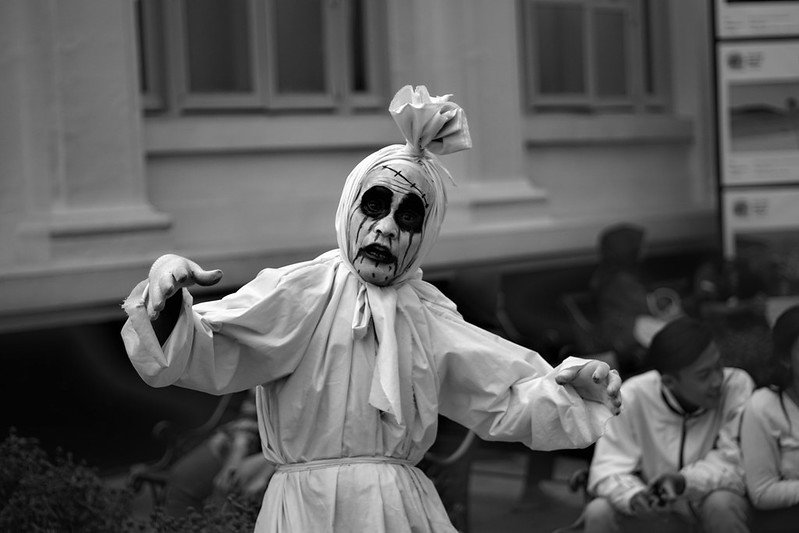Name
Known most frequently as Pocong, or Pochong, meaning “wrapped ghost.” Also known in Indonesia and Malaysia as a kain kafan, which translates roughly to, “(fabric) shroud,” As well as hantu bungkus, or “the wrapped ghost,” in Malaysia.
Physical Description
Described as having a pale green, shriveled, and decaying face–where its eyes should be, there are two abyss-like holes. It is said that due to the Muslim origins of this legend, the pocong is wrapped in the prescribed length of cloth used in Muslim burials to wrap the body of a dead person. The corpse is covered in white fabric which is tied over their head, under their feet, and around the neck. Because they have their feet tied together, the pocong cannot walk, which causes the pocong to hop like a rabbit, but they can hop up to fifty meters (a little over 162 feet) at a time. It is said they also have the ability to fly and teleport.

Origin
Believed to have originated in Indonesia, the pocong is a wrapped ghost that is said to be the soul of a dead person trapped within its shroud. According to the traditional beliefs of the region, the soul of a dead person will stay in the realm of the living for forty days after their death–if the ties of the shroud are not untied after forty days the body is said to jump out from the grave to warn people that they need their soul released. After the ties are untied the soul is released and will leave the realm of the living forever.
Mythology and Lore
The Response to COVID-19
During the COVID-19 crisis of 2020, volunteers began dressing as the pocong, getting wrapped in white sheets and roaming the streets of neighborhoods in Indonesia’s central province on Java island to deter people from going and visiting each other during the period of self-isolation due to the viral outbreak. In Kepuh village of Sukoharjo, volunteers of this phenomenon told Reuters, that they have been conducting surprise patrols every few days since early April. Their plan initially backfired due to the fact that these patrols became a social media sensation–so a bunch of people actually came out of their homes just to see what was going on. Despite the setback, the volunteers of Kepuh have been working to mitigate the impact of COVD-19 through coordinated efforts with ministries, government agencies, and regional administrations.
He added later that the initiative was in cooperation with the local police force, saying that they, “set up the pocong roadblock,” and that the “environment of the village had become more conducive [to the idea of staying inside].”
Is there anything we missed about the Pocong? Let us know in the comments section below!

Georgia-based author and artist, Mary has been a horror aficionado since the mid-2000s. Originally a hobby artist and writer, she found her niche in the horror industry in late 2019 and hasn’t looked back since. Mary’s evolution into a horror expert allowed her to express herself truly for the first time in her life. Now, she prides herself on indulging in the stuff of nightmares.
Mary also moonlights as a content creator across multiple social media platforms—breaking down horror tropes on YouTube, as well as playing horror games and broadcasting live digital art sessions on Twitch.

